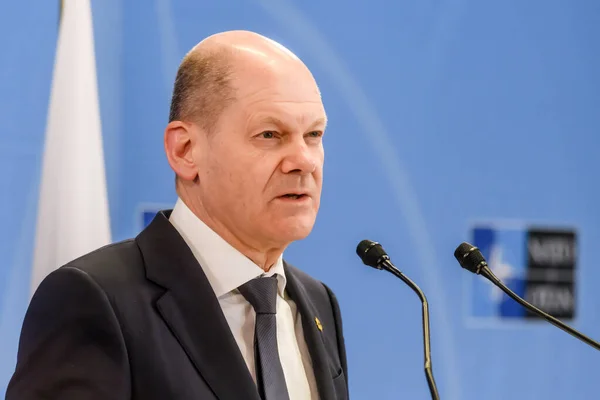German Chancellor Olaf Scholz loses parliamentary confidence vote amid political turmoil, triggering snap elections.
Berlin, December 16, 2024 – German Chancellor Olaf Scholz lost a crucial vote of confidence in the Bundestag on Monday, a development that pushes the European Union’s largest economy towards an early parliamentary election in February 2025. The decision follows weeks of political uncertainty and infighting after the collapse of Mr. Scholz’s fragile coalition government last month.
In the 733-seat Bundestag, German Chancellor garnered only 207 votes of support, while 394 lawmakers voted against him and 116 abstained. Falling significantly short of the required 367 votes for a majority, the result reflects growing discontent among legislators and underscores the fractured state of German politics.
The outcome signals a premature end to the government formed after the 2021 federal elections, where German Chancellor led a historically unconventional three-party coalition. Dubbed the “traffic light” alliance — comprising the center-left Social Democrats (SPD), the pro-business Free Democrats (FDP), and the environmentalist Greens — the coalition was beset by disagreements over economic policies and governance.
German Chancellor Olaf Scholz loses: Collapse of the Coalition
The seeds of the current crisis were sown on November 6, when German Chancellor dismissed Finance Minister Christian Lindner of the FDP, following a bitter clash over economic reforms and fiscal strategy to address Germany’s stagnant growth. The abrupt decision led to the collapse of the coalition, leaving the government in minority status and sparking political uncertainty.
In the wake of the coalition’s disintegration, opposition parties seized the opportunity to call for an early election. Negotiations among party leaders resulted in a consensus to schedule the snap elections for February 23, 2025, seven months ahead of the originally planned date.
Germany’s constitution, shaped by the country’s post-World War II experience, does not permit the Bundestag to dissolve itself. A formal vote of confidence in the Chancellor is the legal mechanism to pave the way for dissolution. Following Monday’s result, President Frank-Walter Steinmeier must now decide whether to dissolve the Bundestag and formally set the election process in motion. Under constitutional provisions, the president has 21 days to act, with most observers expecting a formal decision soon after Christmas.
Elections:
Once the Bundestag is dissolved, elections must be held within 60 days, setting Germany on an accelerated political timeline. For voters, the upcoming election will serve as a referendum not just on German Chancellor leadership but also on the broader policies of his coalition, particularly in areas like economic recovery, climate action, and foreign policy.
Germany, as the EU’s largest economy, faces mounting economic pressures, including sluggish growth, inflationary concerns, and debates over energy transition strategies. The coalition’s inability to find common ground on these issues ultimately eroded public and parliamentary confidence in the government.
Monday’s parliamentary session underscored deep divisions, both within the former coalition and across the opposition. In a symbolic gesture, German Chancellor Scholz was seen shaking hands with Economy and Climate Minister Robert Habeck, signaling an acknowledgment of the challenges ahead.
The forthcoming election promises to reshape Germany’s political landscape. Key players are already positioning themselves to capitalize on the current instability. The conservative Christian Democratic Union (CDU) and its Bavarian sister party, the Christian Social Union (CSU), are expected to be major contenders, while parties like the far-right Alternative for Germany (AfD) aim to expand their influence amid growing voter frustration.
Meanwhile, German Chancellor, Mr. Scholz’s Social Democrats face an uphill battle to regain trust and rebuild their base. Polls suggest that public dissatisfaction with the coalition’s performance, particularly on economic issues, could lead to a challenging election campaign for the SPD.
For German voters, the February election represents a critical moment to decide the country’s future direction. With Europe navigating geopolitical tensions, energy crises, and economic recovery, Germany’s political stability remains pivotal to the broader European Union.
Impact on India
The political instability in Germany and its upcoming elections could have notable implications for India, especially in trade, investment, and diplomatic relations. Germany is India’s largest trading partner in the European Union, with bilateral trade reaching record highs in recent years. Any prolonged political uncertainty or shifts in leadership could delay ongoing negotiations for the India-EU Free Trade Agreement (FTA), which holds significant economic potential for both sides.
Furthermore, German investments in Indian sectors such as renewable energy, automotive manufacturing, and technology are likely to be closely monitored. German companies have played a key role in India’s economic landscape, particularly in the green energy transition and infrastructure development. A change in leadership or policies in Berlin could influence future investment decisions.
Diplomatically, Germany’s position as a strong EU leader has been pivotal in fostering India-EU ties. Any political instability might weaken Germany’s role as a key facilitator of deeper cooperation. Indian businesses and policymakers will need to keep a close eye on developments in Germany to mitigate risks and leverage opportunities emerging from the political transition.
In the days ahead, all eyes will be on President Steinmeier’s decision and the formal dissolution of the Bundestag. As Germany heads into the festive season, the country’s political leaders are already gearing up for what promises to be a fiercely contested and closely watched election. For India, the outcome will be equally significant, given Germany’s role as a critical economic and strategic partner.






